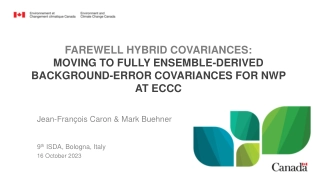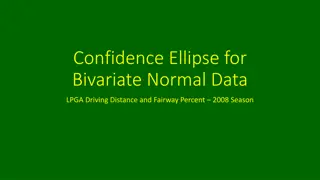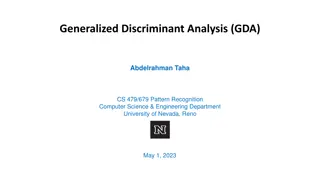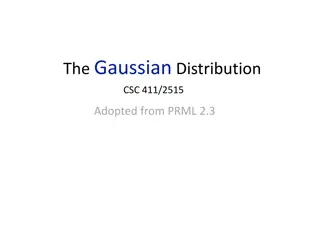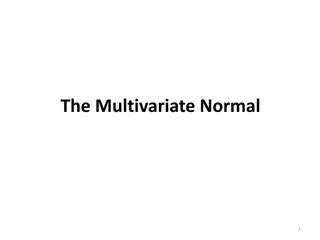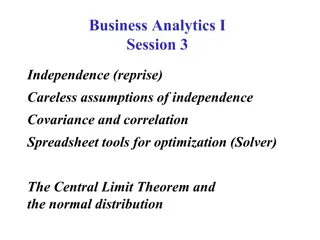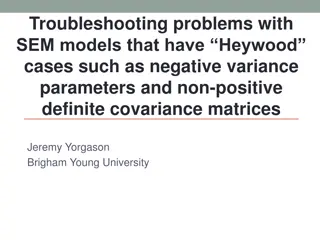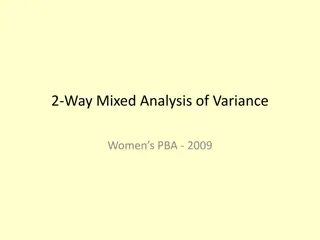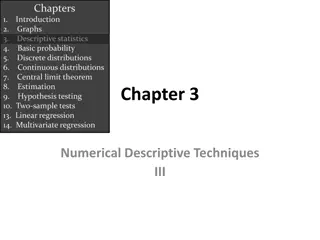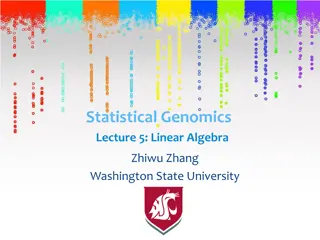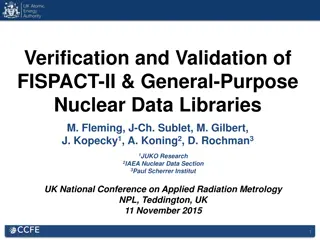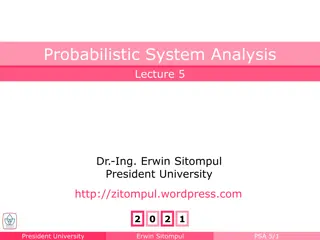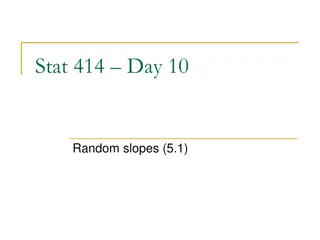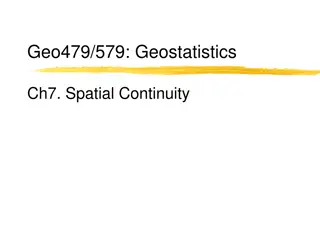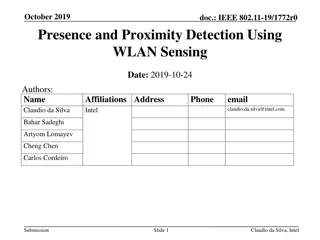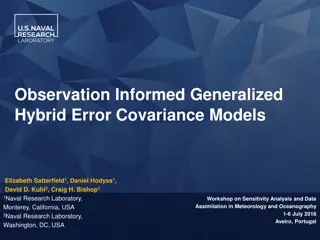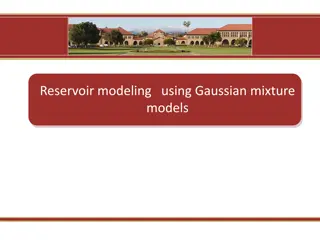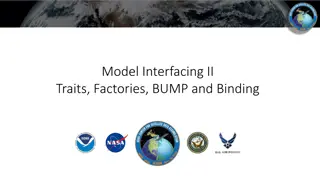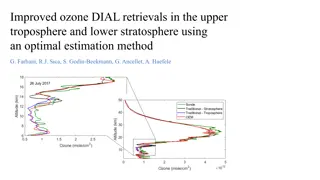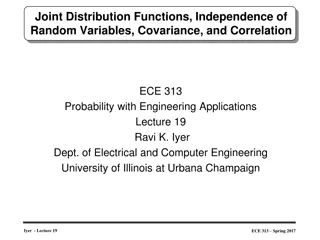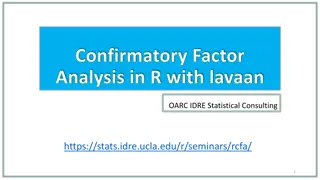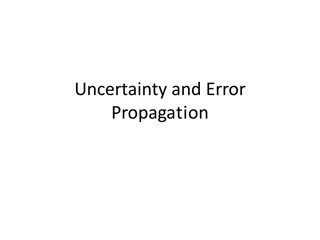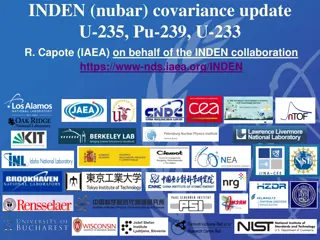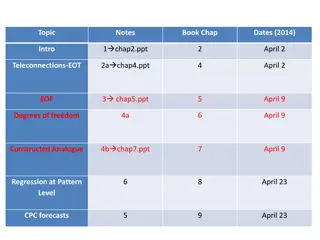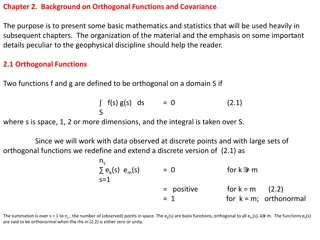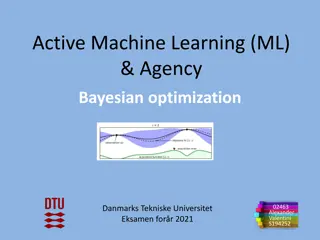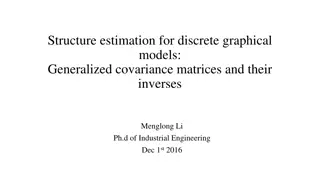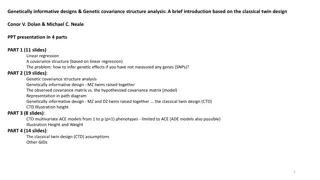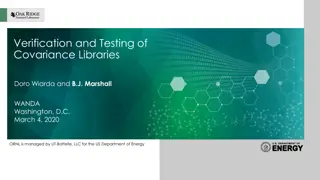Moving Towards Fully Ensemble-Derived Background-Error Covariances for NWP at ECCC
The transition from hybrid covariances to fully ensemble-derived background-error covariances for Numerical Weather Prediction (NWP) at Environment and Climate Change Canada (ECCC) is explored in this paper. It discusses the evolution of covariance formulations, the use of scale-dependent localizati
1 views • 20 slides
Bivariate Normal Data Analysis: LPGA 2008 Season Overview
Explore the analysis of bivariate normal data focusing on LPGA driving distance and fairway percent from the 2008 season. Learn how to compute confidence ellipses, estimated means, variance-covariance matrix, eigenvalues, eigenvectors, and plot insightful visualizations. Understand the method, set u
1 views • 8 slides
Generalized Discriminant Analysis (GDA) in Pattern Recognition
Generalized Discriminant Analysis (GDA) is a nonlinear form of Linear Discriminant Analysis (LDA) that utilizes kernel methods to find discriminatory features for optimal class separability. LDA aims to maximize the between-class covariance matrix while minimizing the within-class covariance matrix.
2 views • 17 slides
The Gaussian Distribution and Its Properties
This insightful content dives into the Gaussian Distribution, including its formulation for multidimensional vectors, properties, conditional laws, and examples. Explore topics like Mahalanobis distance, covariance matrix, elliptical surfaces, and the Gaussian distribution as a Gaussian function. Di
0 views • 19 slides
Multivariate Normal Distribution and Simulation in PROC SIMNORM
Explore the concepts of multivariate normal distribution, linear combinations, subsets, and variance-covariance in statistical analysis. Learn to simulate data using PROC SIMNORM and analyze variance-covariance from existing datasets to gain insights into multivariate distributions. Visualize data t
1 views • 16 slides
Correlation and Covariance in Business Analytics
Explore the concepts of covariance and correlation in business analytics to understand the relationship between random variables. Delve into how these measures help analyze dependence between variables, differentiate between independence and covariance, and interpret correlation as a dimensionless m
4 views • 27 slides
Troubleshooting Heywood Cases in SEM Models
In structural equation modeling (SEM), encountering improper solutions like negative variance parameters and non-positive definite covariance matrices is common. These issues can lead to untrustworthy results and affect the standard errors of estimates. This segment provides insights on recognizing
2 views • 25 slides
Analysis of Variance in Women's Professional Bowling Association - 2009
This study conducted a 2-Way Mixed Analysis of Variance on the Women's Professional Bowling Association qualifying rounds in 2009 at Alan Park, Michigan. The analysis focused on factors including oil pattern variations and different bowlers, each rolling sets of games on different patterns to measur
1 views • 16 slides
Measures of Linear Relationship in Statistics
Exploring the concepts of covariance and correlation coefficient in statistics to determine the strength and direction of linear relationships between variables. Covariance indicates the pattern two variables move together, while correlation coefficient quantifies the strength of the relationship. S
0 views • 35 slides
Statistical Genomics Lecture 5: Linear Algebra Homework Questions
Explore the concepts of random variables, covariance matrix, special matrices, and self-defined functions in statistical genomics through a series of homework questions. Gain insights into linear algebra and statistical genomics while working on Homework 1, analyzing the expectation and variance of
2 views • 22 slides
Verification and Validation of FISPACT-II & General-Purpose Nuclear Data Libraries
The paper discusses the verification and validation of FISPACT-II and general-purpose nuclear data libraries presented at the UK National Conference on Applied Radiation Metrology. It covers new features of FISPACT-II, fusion decay heat experiments, uncertainty quantification, collaboration opportun
0 views • 17 slides
Variance and Covariance in Probabilistic System Analysis
Variance and covariance play crucial roles in probabilistic system analysis. Variance measures the variability in a probability distribution, while covariance describes the relationship between two random variables. This lecture by Dr. Erwin Sitompul at President University delves into these concept
4 views • 30 slides
Algorithm Performance in Data Set 1 with LDA, CART, and K-Means
Utilizing Linear Discriminant Analysis (LDA), Classification and Regression Trees (CART), and K-Means algorithms on Data Set 1. CART training involved tuning the number of leaves for optimal performance, while LDA explored covariance variations and discriminant types. The K-Means method was applied
0 views • 15 slides
Random Slopes in Data Analysis
Exploring the impact of grand-mean and group-mean centering on intercept interpretation with random slopes, as well as variations in slope/intercept covariance. Differentiating between fixed and random coefficients, and the effects of adding group mean as a Level 2 variable. Delving into within vs.
1 views • 21 slides
Spatial Continuity in Geostatistics
Explore the concept of spatial continuity in geostatistics through descriptive analysis of sample data, variograms, covariance functions, and omnidirectional variograms. Learn about terminologies such as range, sill, and nugget effect, and the importance of omnidirectional variograms in capturing ov
0 views • 40 slides
Gaussian Processes: A Comprehensive Overview
Gaussian Processes (GPs) have wide applications in statistics and machine learning, encompassing regression, spatial interpolation, uncertainty quantification, and more. This content delves into the nature of GPs, their use in different communities, modeling mean and covariance, as well as the nuanc
0 views • 50 slides
Presence and Proximity Detection Using WLAN Sensing
This document discusses the utilization of WLAN sensing for presence and proximity detection, focusing on identifying the presence of individuals, determining the number of people, monitoring well-being, and detecting human subjects in various environments. It explores use cases in smart home monito
0 views • 17 slides
Investigation of Observation-Informed Generalized Hybrid Error Covariance Models
In the field of meteorology and oceanography, the study focuses on the development of hybrid error covariance models that combine flow-dependent and climatologically-based estimates for improved data assimilation. The research aims to determine optimal hybridization parameters through innovative met
0 views • 14 slides
Reservoir Modeling Using Gaussian Mixture Models
In the field of reservoir modeling, Gaussian mixture models offer a powerful approach to estimating rock properties such as porosity, sand/clay content, and saturations using seismic data. This analytical solution of the Bayesian linear inverse problem provides insights into modeling reservoir prope
0 views • 10 slides
Univariate Models in OpenMx for Behavioral Genetics Research
Explore the concepts of univariate models in behavioral genetics research using OpenMx with practical examples and insights. Understand the building blocks of matrices, covariance modeling, and estimating parameters A, C, and E. Learn how to run and analyze ACE models and record outputs effectively.
0 views • 42 slides
Traits, Factories, BUMP and Binding in Model Interfacing
This article delves into the use of Traits and Factories in handling class implementations within models. It covers the specific roles of Traits such as Geometry, State, and Increment, along with Factories like Model, Bias, Error Covariance, Localization, and Change Variables. BUMP, a generic implem
0 views • 21 slides
Improved ozone DIAL retrievals in the upper troposphere and lower stratosphere using an optimal estimation method
Enhance ozone DIAL retrievals in the upper troposphere and lower stratosphere through an optimal estimation method. The process involves the Bayesian theorem, forward models, measurement vectors, and more. Explore the application of the Optimal Estimation Method (OEM) in ozone retrieval, including f
0 views • 11 slides
Joint Distribution Functions, Independence of Random Variables, Covariance, and Correlation
This lecture covers the concepts of joint distribution functions, independence of random variables, covariance, correlation, and standby redundancy analysis in the context of engineering applications. It explores the probability density functions and failure scenarios of components in a standby syst
0 views • 13 slides
Confirmatory Factor Analysis in R with lavaan
In this guide on Confirmatory Factor Analysis (CFA) using lavaan in R, you will learn the basics with a motivating example, model fit statistics, and practical implementation steps. Understand the variance-covariance matrix, path diagram, model-implied covariance matrix, and more. Explore one-factor
0 views • 54 slides
Recap on Correlation Strength and Covariance
This content provides a recap on correlation strength, highlighting the relationship between variables based on their correlation value. It also touches on covariance, explaining how variables vary with each other. The examples and explanations help in understanding these statistical concepts better
0 views • 27 slides
Portfolio theory
In the realm of finance, portfolio theory plays a crucial role in investment decisions by analyzing the relationship between assets and returns. Descriptive statistics, on the other hand, provide valuable insights from data regarding means, variances, and standard deviations. Covariance and correlat
0 views • 11 slides
Error Propagation and Uncertainty in System Analysis
Explore the intricate concept of error propagation and uncertainty in system analysis. Dive into the Gaussian distribution, perception of uncertainty, and the effective propagation of uncertainties in multi-input, multi-output systems. Understand how random variables interact, how variances combine,
0 views • 14 slides
INDEN Nuclear Data Update on U-235, Pu-239, U-233 Covariance
Collaboration led by Roberto Capote from IAEA presents updates on nubar covariance for U-235, Pu-239, and U-233. Includes reintroduction of nubar fluctuations, missed experiment details, and reductions in uncertainties for fissile materials in the energy range 20eV-50keV. The advancements aim to enh
0 views • 4 slides
Understanding Empirical Orthogonal Functions (EOF) and Principal Component Analysis (PCA)
This text delves into the concept of Empirical Orthogonal Functions (EOF) and Principal Component Analysis (PCA) in meteorology, discussing methods, definitions, and the covariance matrix used in analyzing space-time relationships. It explains how EOFs help in reducing the dimensionality of data set
0 views • 37 slides
Variance and Covariance in Probabilistic System Analysis
Explore the concept of variance and covariance in probabilistic system analysis, understanding the importance of variability in probability distributions. Learn how to calculate variances for different scenarios and apply them to real-world examples to analyze data variability effectively.
0 views • 30 slides
Extensions of Linear Regression Model: Concepts and Applications
Explore the various extensions of the linear regression model in microeconometric modeling, covering topics such as quantile regression, robust covariance matrices, heteroscedasticity, and bootstrapping for estimating variances of estimators. Learn about robust inference, hypothesis testing, and con
0 views • 17 slides
Understanding Orthogonal Functions and Covariance in Geophysics
Explore the fundamentals of orthogonal functions and covariance, crucial in geophysical studies. Learn about basis functions, orthonormality, variance representation, and Fourier power spectrum. Gain insights into how orthogonal functions contribute to functional data representation and spectral ana
0 views • 21 slides
Understanding Multidimensional Gaussians and Covariance in Machine Learning
Explore the concept of multidimensional Gaussians in machine learning, from random vectors to covariance matrices. Learn about unequal variances and independence in two-dimensional data points with insightful visuals to deepen your understanding.
0 views • 25 slides
Agency Bayesian Optimization with Gaussian Processes
Explore the role of covariance functions in Gaussian processes for active machine learning and agency applications. Understand how kernel functions create covariance matrices, influencing the distribution of function values. Learn about smoothness assumptions, signal variance, noise variance, and mo
0 views • 49 slides
Estimation of Graphical Models Using Generalized Covariance Matrices
Explore the structure estimation for discrete graphical models by analyzing the relationships between conditional independence and inverse covariance matrices. The extension of Gaussian graphical models, Ising models, and more is discussed, providing insights into graph structures based on covarianc
0 views • 16 slides
Genetic Covariance Structure Analysis in Classical Twin Design
Explore the classical twin design and genetic covariance structure analysis, focusing on inferring genetic effects without measuring genes. Learn about genetically informative designs, covariance structures, multivariate models, and assumptions underlying the classical twin design. Discover how to f
0 views • 56 slides
Advanced Analysis of Covariance Methods Explained
Explore the nuances of Analysis of Covariance (ANCOVA) in this comprehensive guide. Learn how to compare treatments while controlling for numeric predictors, understand single and multiple factor models, delve into additive and interaction models, and discover generalizations for handling random cov
0 views • 9 slides
Progress of IRSN on Nuclear Data Assessment for Molybdenum
Explore the progress made by IRSN on nuclear data assessment for Molybdenum through working package WP2 & 4. The assessment focuses on producing Mo evaluation with covariance for RP and cross sections using various sources like JEFF-33, ENDF/B-VIII.0, and JENDL-4.0. The project involves fitting expe
0 views • 7 slides
Verification and Testing of Covariance Libraries: Insights and Improvements
Explore the current verification and testing processes of covariance libraries, including automatic checks, corrections, and data inspections. Learn about the AMPX system, data uncertainty propagation, and suggestions for enhancements in validation and benchmark measurements. Find out what's missing
0 views • 8 slides
Improved Covariance Data Adjustment Tools for Nuclear Applications
Explore data adjustment tools for developing application-specific covariance libraries to address uncertainties in integral quantities like keff in nuclear applications. Generalized linear least squares method is utilized to adjust data and generate consistent results. Further improvements and expan
0 views • 7 slides
